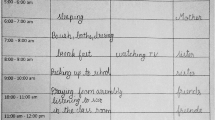Abstract
The current knowledge society has provided psychic and social transformations that cannot be compared to any point in the history of humanity. One of the hallmarks of the expression of human individuality is the complexity of activities in which young people are involved. How are the youth coping with their daily activities? To answer this question, a mixed study was conducted, being of a quantitative and qualitative nature, with 163 Brazilian university students from two higher education institutions. The data collected show that one of the notable areas of their daily lives is the significant number of activities in which they are involved, especially those pervaded by digital technologies. From the birth to the death of an everyday activity, time is a mere demarcation, because what counts is the ability of that activity to promote excitement.



Similar content being viewed by others
Notes
Data coming from Computer World available at http://computerworld.com.br/dados-o-fundamento-da-transformaca-digital, accessed on May 15, 2018.
References
Adorno, T. (1998). Education after Auschwitz. In Critical Models: Interventions and Catchwords (pp. 191–204). New York: Columbia University Press.
Bhattacherjee, A. (2012). Social Science Research: Principles, Methods, And Practices. Florida: University of South Florida.
Bourdieu, P. (1986). The forms of capital. In J. Richardson (Ed.), Handbook of Theory and Research for the Sociology of Education (pp. 241–258). Westport: Greenwood.
Cabitza, F., Cerroni, A., Locoro, A., & Simone, C. (2014). The Knowledge-stream Model – A Comprehensive Model for Knowledge Circulation in Communities of Knowledgeable Practitioners. In: Proceedings of the International Conference on Knowledge Management and Information Sharing. IC3K. Roma, 367–374.
Caillois, R. (1994). Los juegos y los hombres: la máscara y el vértigo. D.F, México: Fondo de Cultura Económica.
Cerroni, A. (2006). Scienza e società della conoscenza. Milano: UTET.
Cerroni A. (2011). Scienza e tecnologia nella società contemporanea. Comunicazione, governance democratica, Social innovation, Città in controluce, p.11–24.
Cerroni, A. (2012). Il futuro oggi, Immaginazione sociologica e innovazione: una mappa fra miti antichi e moderni. Milano: FrancoAngeli.
Cerroni, A., & Simonella, Z. (2014). Scientific community through grid-group analysis. Social Science Information, 53(1), 119–138.
Chaves, H. V., & Maia Filho, O. N. (2016). Percepção de tempo e necessidade de atividade na sociedade do excesso: educação no contexto das tecnologias digitais. ETD – Educação Temática Digital, 18(1), 71–82.
Danah, B., & Crawford, K. (2012). Critical questions for Big Data: provocations for a cultural, technological, and scholarly phenomenon. Information, Communication & Society, 15(5), 662–679.
Debord, G. (2005). A sociedade do espetáculo (p. 2005). Lisboa: Antipáticas.
Durkheim, E. (2016). La divisione del lavoro sociale. Milano: il Saggiatore.
Elias, N. (1990). La sociedad de los individuos. Barcelona: Península.
Elias, N., & Dunning, E. (1992). A busca da excitação. Lisboa: DIFEL.
Empson, W. (2008). Seven types of ambiguity. Bridgeton: Seabrook Press.
Furedi, F. (2006). Culture of Fear Revisited, Risk-taking and the morality of low expectation. London: Continuum.
Gregolin, M. R. V. (1995). Análise do discurso: conceitos e aplicações. Alfa, 39, 13–21.
Gui, M., Fasoli, M., & Carradore, R. (2017). “Digital well-being”. Developing a new theoretical tool for media literacy research. Italian Journal of Sociology of Education, 9(1), 155–173.
Kirschner, P. A., & Karpinski. (2010). A. C. Facebook and academic performance. Computers in Human Behavior, 26(6), 1237–1245.
Koyrè, A. (2003). Filosofia e storie della scienza. Milano: Mimesis.
Lasch, C. (1992). La cultura del narcisismo: L’individuo in fuga dal sociale in un’età di disillusioni colletlive. Milano: Bompiano.
Maingueneau, D. (1997). Novas tendências em análise do discurso. Campinas: UNICAMP.
Mussalim, F. (2001). Análise do discurso In: Mussalim, F., & Bentes, A. C. (Orgs.) Introdução à linguística: domínios e fronteiras. Vol. 2. São Paulo: Cortez, pp. 101-142.
Parker, I. (2005). Qualitative Psychology: Introducing Radical Research. Berkshire: McGraw-Hill.
Perrota, C. (2014). Do school-level factors influence the educational benefits of digital technology? A critical analysis of teachers’ perceptions. British Journal of Educational Technology, 44(2), 314–327.
Postman, N. (1994). Tecnopólio: a rendição da cultura à tecnologia. São Paulo: Nobel.
Sini, C. (2011). Il lavoro e le forme del fare. Nóema, 2, 1–7.
Trigano, P. (2006). Self-Regulated Learning in a TELE at the Université de Technologie de Compiègne: an analysis from multiple perspectives. European Journal of Education, 41(3), 381–395.
Tsatsou, P. (2009). Reconceptualising ‘Time’ and). Space’ in the era of electronic media and communications. Journal of Media and Communication, 1, 11–32.
Türcke, C. (2012). La società eccitata. Filosofia della sensazione. Torino: Bollati Boringhieri.
Vygotski, L. S. (2000). Obras escogidas, Problemas del desarrollo de la psique. Tomo III. Madrid: Visor.
Vygotski, L. S. (2001). Obras escogidas, Pensamiento y lenguaje. Tomo II. Madrid: Visor.
Vygotski, L. S. (2003). La imaginación y el arte en la infancia. Madrid: Akal.
William, P. S. (2017). Can we borrow your phone? Employee privacy in the BYOD era. Journal of Information, Communication and Ethics in Society, 15(4), 397–411.
Zimmerman, B. (1990). Self-Regulated Learning and Academic Achievement: An Overview. Educational psychologist, 25(1), 3–17.
Author information
Authors and Affiliations
Corresponding author
Ethics declarations
Ethical Approval
All procedures performed in studies involving human participants were in accordance with the ethical standards of the institutional and/or national research committee (Resolution CNS n° 466/2012) and with the 1964 Helsinki declaration and its later amendments or comparable ethical standards.
Additional information
Publisher’s note
Springer Nature remains neutral with regard to jurisdictional claims in published maps and institutional affiliations.
Rights and permissions
About this article
Cite this article
Chaves, H.V., de Melo Maia, L.F., de Araújo Bezerra, A.L. et al. Daily life experiences of Brazilian university students in the knowledge society. Curr Psychol 40, 2745–2753 (2021). https://doi.org/10.1007/s12144-019-00211-2
Published:
Issue Date:
DOI: https://doi.org/10.1007/s12144-019-00211-2




